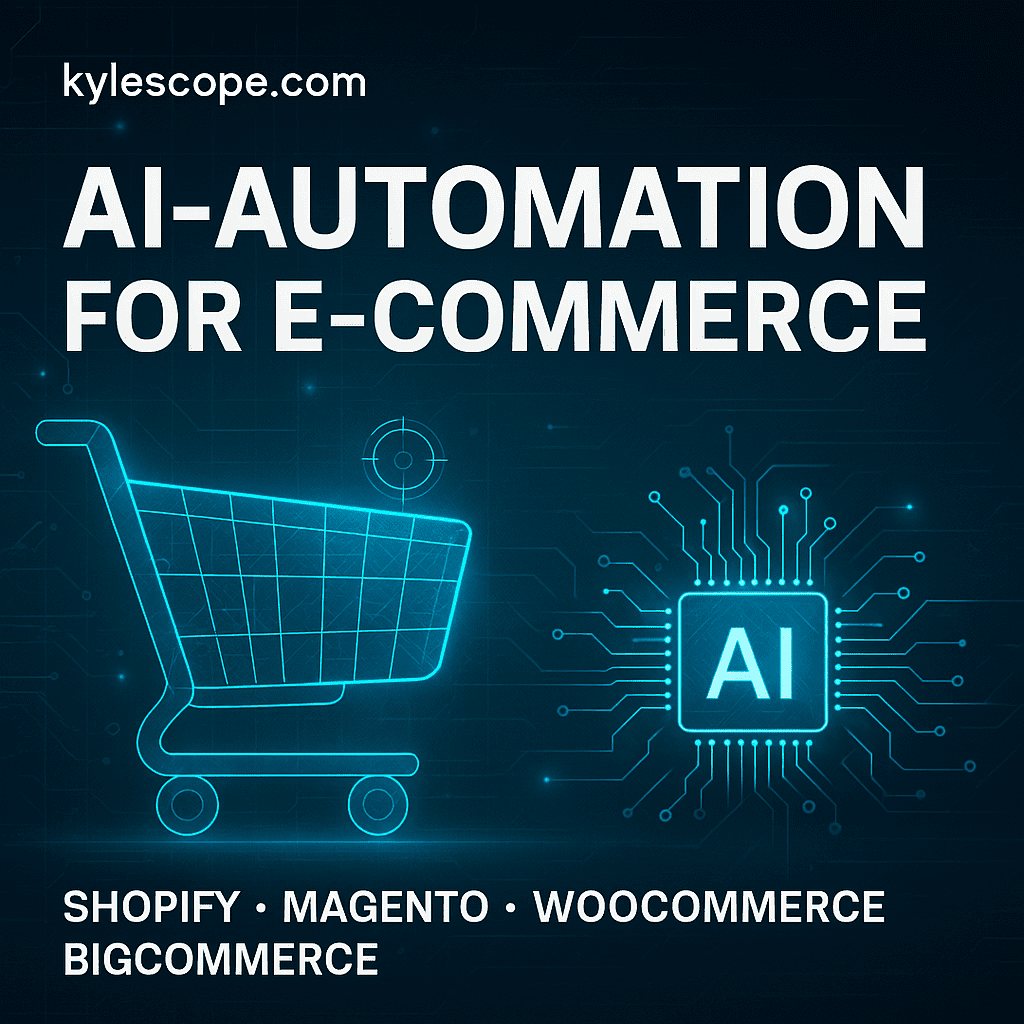Developments in the generative AI and automation domains are revolutionizing e-commerce by developing contextually relevant buying experiences for users. These revolutions are enhancing workflows in e-commerce, including product discovery, evaluation, purchase decision, checkout process, order fulfillment, post-purchase engagement, insight, and analytics. For example, voice navigation AI tools will revolutionize how website users navigate and use a system. Automation helps many processes, including supply chain management, inventory management, order processing, shipping, customer service, email marketing, and advertising. This article defines AI Automation in E-commerce, lists the benefits of AI automation in e-commerce, lists popular AI-automation tools for e-commerce, and elaborates on how to automate your e-commerce business.

What is AI Automation in E-commerce?
Picture some of the activities performed on an e-commerce platform, such as keyword research, content writing, content optimization, image creation, customer support, marketing, analytics, insights generation, and so much more. These activities can be tedious for one person to perform. However, artificial intelligence is now stepping into the scene to streamline some of these processes. This has created the domain of AI-automation in e-commerce platforms.
AI automation in e-commerce refers to the process of systemizing e-commerce tasks and processes. Some examples of functions and processes that benefit from AI-automation include backend operations, customer support, checkout and purchase, marketing, conversion optimization, search and discovery, and product (inventory) management. The term ‘AI Automation in E-commerce’ bears some resemblance, albeit major differences, to ‘e-commerce process automation’.
What is e-commerce process automation?
E-commerce process automation utilizes artificial intelligence aspects, including machine learning, natural language processing, and process automation to handle monotonous processes. Some of the methods that e-commerce platforms can automate include sourcing, sales, marketing, inventory management, and personalized product recommendations. Other methods include dynamic pricing, demand forecasting, customer service, and customized shopping. Additionally, process automation applies to advertising, customer engagement, fraud prevention, customer retargeting, order fulfillment, offer recommendation, content creation, and so much more.
How to Automate Processes in E-commerce
E-commerce AI process automation utilizes unstructured data formats to derive insights and inform intelligent decision-making. Therefore, e-commerce platforms empowered with AI-powered process automation studies, acclimate, and implement decisions backed by data.
What is workflow automation in e-commerce?
E-commerce workflow automation builds on process automation. E-commerce workflow automation refers to the implementation of a seamless flow of documents, tasks, and information across activities related to each other to create independent systems that operate based on predefined business rules or regulations. Workflow accounts for all the processes required for task completion and integrates artificial intelligence into activities that would otherwise require human intervention.
How to Automate Workflow in E-commerce
Workflow automation in e-commerce entails task identification for processes required in a job. The system then works based on preset rules and logic, which determine the performance of critical tasks. The preset rules and logic consist of if-then statements, which act as instructions for the e-commerce system. These instructions help the e-commerce platform to make precise actions and determine movement from one task or process to the next.
How E-Commerce Automation Works
E-commerce automation utilizes three vital steps in achieving its goals. The three steps include:
- Trigger– this refers to what takes place when an event happens, for example, when a customer places an order
- Condition– this refers to conditions that would cause the appropriate action below
- Action– refers to the resulting consequence
An example of this automation, as depicted above, is when one owns an online furniture store and plans to implement a sales program. Let us say that the online store owner would like to provide discount rates based on the customer’s expenses on the online store.
For example:
Platinum customer: spends more than $6000 and gets a 50% discount
Gold Customers: Spend more than $4000 and get a 40% discount
Silver Customer: Spends more than $3000 and receives a 30% discount
E-commerce automation makes it easy for the e-commerce platform on which the above online furniture store operates to implement. The trigger takes place when the customer places their order, while the condition takes place when the customer’s expenses reach certain levels, and actions refer to the discounts provided for the same customers.
You can consult professional AI automation experts free of charge to help with your specific case and conditions.
10 Benefits of AI Automation for Online Services
The primary benefits of AI automation for online services include time savings, financial savings, enhanced data relevance, and improved productivity. The section below elaborates on the benefits in more detail.
- Enhanced efficiency- implementing artificial intelligence automation empowers online store owners to improve their work output using minimal resources. This ultimately boosts their productivity, reduces expenses, and creates faster processes.
- Enhanced job satisfaction- AI automation emancipates employees from tedious manual tasks to focus on work that necessitates creativity and fun.
- Improved customer experience- automation lays down content, information, and tasks that improve customer engagement throughout their lifecycle with the online business. Such AI tools improve communication and allow the individualization of shopping experiences.
- Acquisition of data insights for improved decision-making- artificial intelligence automation in e-commerce reduces the chances of human error. It makes the generation of reports effortless in comparison to manual reporting processes. This enables online stores to make decisions based on real insights, which ultimately guide the business in the most appropriate direction.
- Scalability- artificial intelligence automation enables online stores to free up resources for scaling. The free resources empower the business to extend its business scope much more effectively.
- Enhanced sales and marketing effectiveness- automation enhances sales and marketing initiatives through the provision of personalized customer services, timely responses to customer activities through automated emails/messages, and the effective scheduling of marketing campaigns.
- Increased human resource productivity- automated e-commerce platforms empower process builders to reduce the time it takes to implement processes from days and months to minutes and hours.
- Improved accuracy: manual processes are prone to errors. AI automation eradicates the chances of making the same mistakes.
- Digital transformation- AI automation enables online businesses to embrace digitization across functions and roles.
- Reduced operational costs- this is a no-brainer.
Popular AI Automation Functions for E-commerce
The section below sheds light on popular processes on E-commerce platforms that benefit from artificial intelligence automation:
Order AI Automation in E-commerce
Artificial intelligence automates order management systems. The precise activities involved in order automation include online payment acceptance, packing slip generation, shipping label development, invoicing, routing orders, personalized deals presentation, courier organization, customer order confirmation, order status confirmation, order tracking, and shipping label generation. Additionally, AI automation enables chatbots to manage customer enquiries, and automated cross-selling and up-selling. Moreover, computerized order management allows dynamic allocation of fulfillment according to the most efficient routes, transport costs, and stock.
Inventory Management AI Automation in E-commerce
Artificial intelligence enables online store owners to track stock levels across locations and provides viable information. This helps store owners to save time and prevents problems of under-stocking and overselling. Such systems can also place orders for restocking when existing stock falls below certain levels because they can place purchase orders without the owner’s intervention. Moreover, AI-powered e-commerce platforms can create automatic reports, harmonize sales and stock levels for accounting purposes, and create bills of materials for producers.
Supply Chain and Logistics AI Automation in E-commerce
Such automation tools enable synchronicity in the supply chain to reduce costs, enhance supply visibility, and improve partnership. Artificial intelligence can optimize shipping routes, costs, and traffic based on insights acquired from historical data.
Accounting AI Automation in E-commerce
Artificial intelligence enables e-commerce stores to juggle complex accounting tasks, including their numerous inputs, such as tax responsibilities. Such automation enhances accuracy by limiting manual human output. Some of the everyday tasks that necessitate accounting automation include cost tracking, expenses tracking, asset tracking, liabilities tracking, bank reconciliation, inventory value calculation, tax calculations, profitability, invoice generation, and the production of financial reports.
Customer Service AI Automation in E-commerce
Artificial intelligence enables online stores to handle customer inquiries and directs users to appropriate website sections for problem-solving. Online store owners can consult experts for help with installing chatbots to improve their customer engagement and experiences.
Finance AI Automation in E-Commerce
AI automation empowers the automation of finance tasks. The specific functions include payment processing and reconciliation, and order-to-cash cycle activities such as invoice generation, receipt generation, subscription billing, refunds, and chargebacks. Other finance activities covered include accounting and bookkeeping, tax compliance and reporting, financial planning and analysis, vendor and supplier payments handling, inventory costing and valuation, and fraud detection, along with risk management.
Reporting and Analytics AI Automation in E-commerce
Artificial intelligence enables e-commerce platform owners to acquire vital sales and customer data at the click of a button. AI presents such information in formats that are easy to read for decision-making. Moreover, AI reporting features business snapshots that stakeholders may use to examine different sales periods, analyze sales trends, and establish business risks conveniently.
Logistics AI Automation in E-commerce
AI enables e-commerce platforms to acquire logistics information conveniently. Such information includes shipping updates, optimized shipping routes, and delivery notifications to relevant individuals.
How to automate your e-commerce Business
Two methods exist for automating your e-commerce business. The first involves integrating the system on an existing website. This involves finding relevant developers to help. This might be costly. However, you can consult experts here. The second method consists of creating an online store with AI-powered automation for e-commerce.
Do you Need Help with AI Automation in your E-commerce Platform?
Share your details below and we shall get back to you asap!
